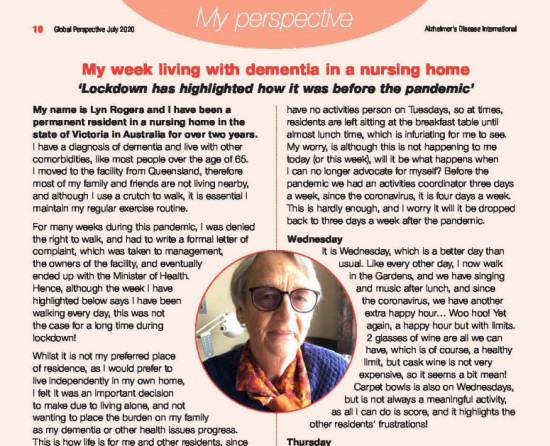Lyn Rogers, a higher functioning nursing home resident with Alzheimer’s writes about her experience. First, what do the experts think about residents being quarantined?
Nursing Home – Solitary Confinement?
Three Health and Aging Policy Fellows, ask Is Solitary Confinement for Nursing Home Residents Worth the Risk of Infection? [TCV Update 11/6/2020 URL no longer available] in The American Society on Aging’s bimonthly publication, Aging Today.
The authors point out that media have focused on the number of cases and deaths and “missed the human experience… What has it been like to live in a nursing home during shutdown? News and civic leaders have ignored isolation, depression, and fear among residents, and anxiety and grief among family and friends.”
Residents are confined to their rooms to reduce the risk of spreading the virus – no social activities, no meals in the dining room. Articles often cite a study that found isolation is as harmful as smoking 15 cigarettes a day.
“Beyond the physical effects, many residents, families, and friends suffered emotional harm from their forced estrangement.” It’s worse for a person with dementia who may not understand why she can’t eat with her friends or why he is being punished. “Residents who value their right to self-determination also suffered harm to their dignity by being denied a say in their own lives.”
“A full life includes interactions with others: shared laughs, warm hugs and meaningful relationships.”
The authors conclude that public policy must be weighed against residents’ and their families’ rights to choose. Older adults should not be forced to be alone without their own thoughtful consideration or their surrogate. “To do otherwise perpetuates infantilization of residents, and ageism for this population.”
An example of this is Lyn Rogers’ experience, which includes her formal complaint to the nursing home to reinstate her activities.
One Nursing Home Resident Writes about the Lockdown
While most who need assistance with their daily activities, such as those with dementia, are able to live at home or with friends or family, those living in care facilities are finding day-to-day life even more restricted.
Click on the image below for the one-page PDF of Ms. Rogers’ article for Alzheimer’s Disease International’s July 2020 issue of Global Perspective. (The URL is at the end of this article.)
Australian nursing home resident, Lyn Rogers, lives far from her family and friends. She writes of filing a formal complaint just to walk in the nearby botanical gardens. She wanted to keep up her regular exercise.
In her experience of how it is to live during “lockdown” she bemoans the happy-hour limit of “only two glasses of wine.” I thought, WOW, how our expectations vary around the world! Here in the U.S. the only way a resident can enjoy a glass of wine in a nursing home is to have a family member or friend sneak in a bottle!
Ms. Rogers writes in a manner we can understand – a testament to the abilities people retain despite being diagnosed with a cognitive impairing disease like Alzheimer’s. She adds, “All days include dinner at 5pm, and supper at 7pm – if I was not living in a nursing home, I’d most likely eat dinner after 7pm, so this is a childlike timeline for adults!!!”
Click on the URL below or the article-image above to read the entire one-page article.










Great Article Brenda, you describe it Nicely about COVID & how senior can stay active. Walk Can do wonder to our seniors & I found yoga also make immune system strong.